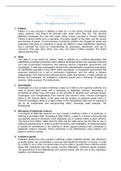The Political Dimension of Europe
List of Concepts
Week 1 The state as the Key Arena for Politics
1. Politics
Politics is a key concept in defining a state as it is the activity through which people
make, preserve, and amend the general rules under which they live. The classical
definition developed from the term polis, which means city-state in Ancient Greece.
Politics is about conflict and co-operation, the public sphere of the state, and the pursuit
and exercise of power. It is the process of resolving conflicts, the struggle for power and
leadership that gives an individual or group the ability to make authoritative decisions,
and it provides the focus for understanding the production, distribution, and use of
resources. Who gets what, when, how, why, and where. Politics example: The Dutch
cabinet and the king.
2. State
The state is a key arena for politics. State is defined as a political association that
establishes sovereign jurisdiction within defined territorial borders and exercises authority
via a set of permanent institutions. Key features: territory, population, government, and
sovereignty. A state has a geographic territory with internationally recognized boundaries,
an identifiable population living within these boundaries, a recognized government that
exercises authority via a set of permanent institutions, and the ability to behave
independently from internal and external factors within that territory. A state protects its
territory and population via institutions, collective goods, and a monopoly of legitimate
violence. State example: The Netherlands.
3. Sovereignty
Sovereignty is a key concept in defining a state as it refers to the supreme authority of a
state to govern itself along with a monopoly of legitimate violence. Sovereignty is
something all states have and refers to the principle of absolute and unlimited power.
Sovereignty acts independently from internal and external rivals. Internal sovereignty
refers to the internal affairs of the state and the location of supreme power within it.
External sovereignty refers to a state’s place in the international order and its capacity to
act as an independent and self-governing entity. Sovereign state example: The
Netherlands.
4. Monopoly of legitimate violence
A monopoly of legitimate violence is a key concept in defining a state, or in particular, in
defining a sovereign state. According to Max Weber; a state is a human community that
successfully claims a monopoly of the legitimate use of violence within a given territory.
This theory from Weber states that the state and the state alone has the right to use or
authorize physical force in order to protect its territory and inhabitants. A limited exception
is existed for self-defense or the defense of others against physical harm. Monopoly of
legitimate violence example: Police authorities in the Netherlands using violence and
power to arrest a criminal.
5. Collective goods
Collective goods are a key concept in defining a state. Collective goods, also referred to
as public goods, are commodities or services that benefit all members of society. In order
for a state to me a state, the government must be able to provide these collective goods
along with institutions that help society function effectively. Collective goods example:
The government of the Netherlands who provide society with the rule of law, regulation,
taxation, and infrastructure.
1
,6. Unitary vs. federal states
A state is a political association that establishes sovereign jurisdiction within defined
territorial borders and exercises authority via a set of permanent institutions. However,
states can be divided between two systems: unitary and federal. A unitary state is a state
governed as a single entity in which the central government is ultimately supreme and
regional provinces have very little power to implement their own policies. A federal state
is a political entity characterized by a union of self-governing provinces, states, or other
regions under a central federal government. In this system, significant power is given to
the regional authorities. A unitary state example: The Netherlands. A federal state
example: Germany.
7. Strong vs. weak states
A state is a political association that establishes sovereign jurisdiction within defined
territorial borders and exercises authority via a set of permanent institutions. A state can
be divided between strong and weak states. This can be defined by size, strength of the
economy, military might, robustness of state institutions, and legitimacy. Size refers to the
geographic spread and population within, strength of the economy refers to the economic
power, military might refers to the amount of armed forces, robustness of state
institutions refers to the institutional stability, and legitimacy refers to the right and
acceptance of an authority to exercise power. In other words, the right to rule. Strong
state example: Germany.
8. Traditional vs. charismatic vs. rational-legal authority
Legitimacy is a key concept in defining a state as it refers to the right and acceptance of
an authority to exercise power. According to Max Weber, legitimacy rooted in three types
of authority: traditional, charismatic, and legal-rational authority. Traditional authority is
derived from traditional customs and values and is based around a traditional respect for
the monarch. Charismatic authority is derived from the charisma of an individual and
relies on the ruler being popular within the population. Rational-legal authority is derived
from the status of an office as part of a system of constitutional rules. Traditional authority
example: Koning Willem Alexander. Charismatic authority example: Napoleon Bonaparte.
Rational-legal authority example: Mark Rutte.
9. Legitimacy
Legitimacy is a key concept in defining a state as it refers to the right and acceptance of
an authority to exercise power. According to Max Weber, legitimacy rooted in three types
of authority: traditional, charismatic, and legal-rational authority. Legitimacy broadly
means rightfulness and refers to the acceptance to rule on behalf of the people. As might
expected, legitimacy is crucial in making a state stable and strong. Legitimacy is
particularly evident in democratic countries where the government has been
democratically elected by the people themselves. Legitimacy example: Accepting that
Mark Rutte has the power to rule in the Netherlands (rational-legal authority).
Week 2 Democratic and Non-democratic Regimes
10. Power (with the three faces)
Power is a key concept in democratic and non-democratic regimes. Power broadly
means the ability to achieve a desired outcome. In other words, it is the capacity of an
individual to influence the actions, beliefs, or conduct behavior of others. Power is a
relation concept that is often compared with coercion of force and can be divided
between decision making, agenda setting, and thought control. Decision making is the
power to shape actions or influence decisions. Agenda setting is the ability to prevent
decisions from being made, in effect, non-decision making. Thought control is the ability
2
, to influence another by shaping what he or she thinks, wants, or needs. This is portrayed
as a radical face of power. Thought control example: North-Korea.
11. Narrow vs. broad definition of democracy
A democracy is a democratic regime that is defined as a government of the people, by
the people, and for the people. This definition highlights three core features; political
equality, importance of popular participation, and ruling the public interest. However, a
distinction can be made between a narrow and broad definition of democracy. Narrow
democracy focusses on the means of democracy. According to this definition, democracy
entails competitive elections and the participation of electorate. Broad democracy
focusses on the goals of democracy as it emphasizes ideas and values that organize
society. Broad democracy example: Rule of law, free economy, and choice and debate.
12. Direct vs. representative democracy
A democracy is a democratic regime that is defined as a government of the people, by
the people, and for the people. However, there are a number of models of democracy
and the most important distinction is made between a direct and representative
democracy. A direct democracy is a system of popular self-government as the power is in
the hands of the people. Decisions are not taken by representatives but voted on by the
people themselves through the use of referenda. A representative democracy, also
known as indirect democracy, is an indirect and limited form of rule. In a representative
democracy, power is in the hands of the representatives who are elected by the people
and rule on their behalf. Representative democracies are divided between a pluralist and
an elitist democracy. Direct democracy example: Switzerland. Representative democracy
example: The Netherlands.
13. Pluralism vs elitism
A representative democracy is a democratic regime that is defined as an indirect and
limited form of rule where the power is in the hands of the representatives. However, a
distinction is made between two forms; pluralism and elitism. Pluralism is the recognition
of diversity within a political body. It is defined as a society where multiple people,
groups, or entities share political power and are free and different in their interests and
beliefs. Elitism is the belief that a society or system should be led by an elite. This theory
states that an elite is more likely to be constructive to society as a whole and therefore
deserves influence and authority greater than others. Elitism comes in three forms:
normative, classical, and modern elitism. Pluralism example: The Dutch parliament
(represents diversity and different parties). Elitism example: the UK (represented by
wealthy and powerful white man in society).
14. Liberal democracy
A liberal democracy is a democratic regime that balances the principle of limited
government power against the ideal of popular consent. Liberal features are reflected in
internal and external checks on government and designed to guarantee liberty and afford
citizens protection against the state. Democratic features are based on a system of
regular and competitive elections, universal suffrage, and political equality. In economic
and social issues, liberal democracies emphasize freedom over collective equality. Core
features; guaranteed civil liberties and individual rights, system of check and balances,
regular elections, political pluralism, civil society, capitalist economy, and the rule of law.
Liberal democracy example: USA.
15. Social democracy
A social democracy is a democratic regime that advocates a balance between the market
and the state, and between the individual and the community. The chief characteristic of
a social democracy is the belief in reform within capitalism, underpinned by a general
concern for the underdogs in society, the weak and vulnerable. In economic and social
issues, social democracies emphasize equality over freedom. It requires a strong state to
3






